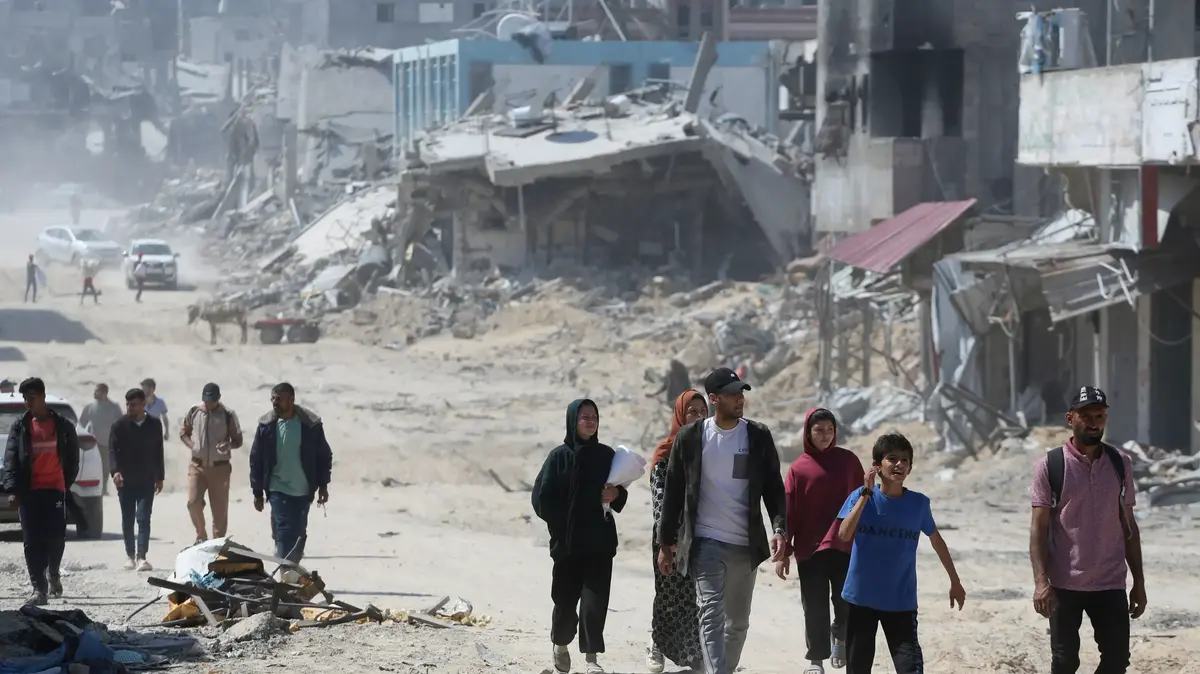Although the State of Israel is more exposed to the risks of climate change - it is not prepared for the climate crisis: 84 percent of public bodies do not have a plan to deal with the crisis and Israel does not operate on the basis of budgeted and approved national preparedness. Engelman, in relation to the state's readiness for the climate crisis.
"The data is a warning light," warns the state comptroller.
"The climate crisis is one in which state preparedness is a key component of the national strategy to strengthen public resilience, and touches on all areas of life - the economy, health, transport and more, as part of a global effort."
"Increasing and exacerbating climatic events, along with continuing to change climate patterns, could cause significant damage and damage to the Israeli economy and carry a risk to Israel's national security. It is important that the State of Israel be prepared for these consequences ahead of time."
The complex report brings up a series of serious data that are acute in relation to dealing with the climate crisis.
The report raises a string of serious data based on the fact that 20 years after joining the UN Framework Convention on Climate Change (UNFCC) - Israel is adopting a non-ambitious per capita reduction target and is not a leading country in setting greenhouse gas reduction targets as required by the Paris Agreement.
"The data constitutes a warning light" // Photo: AFP,
At the base level, greenhouse gas emissions per capita in Israel are high compared to other countries: the emission values for Israel's relatively high square kilometers (3.6 tons per square kilometer as of 2018), combined with being a country with a population of about 9.3 million, means that Israel emits Greenhouse gases of a similar size to a medium-sized country.
Examining setting targets for reducing greenhouse gas emissions shows that Israel has set a target for reducing GHG emissions per capita only, although developed countries must set targets with absolute and ambitious values. In practice, setting targets per capita allows Israel to increase the absolute amount of emissions as long as there is population growth. Contrary to the (negative) trend in other OECD countries.
In practice, Israel set a target for reducing GHG emissions which was expected to lead to an absolute increase of 103% in emissions compared to 1990 and of 12% compared to 2005, while the targets of the other countries surveyed (Switzerland, EU, Canada, USA, Mexico and South Korea ) Were expected to lead to an average decrease of 32% and 33%, respectively. In 2015-2020, there was an increase in Israel's absolute emissions. Private travel increased from 42 billion km in 2015 to about 50 billion km in 2019.
May cause damage to the Israeli economy "// Photo: AFP,
In addition, the energy efficiency was about 62% less than the set target.
In addition, out of NIS 800 million allocated in government decisions in favor of reducing GHG emissions through streamlining, at least NIS 500 million was not used.
As for electricity generation from renewable energies: Israel did not meet the 10% target set for itself in Government Resolution 4450 from 2009 to 2020 (in practice - a rate of 35% - 40% less than the target set), and the progress towards achieving a target of 17% renewable energies for 2030 is small (especially Opposite the emerging target of 30%), and reached only 6.1% as of the end of 2020.
In addition, in the process of transitioning to a low-carbon 2050 economy led by the Ministry of Public Works, delays in formulating targets were found mainly in the field of energy due to lack of agreements on targets between the Ministries of Energy and Environmental Protection.
The multiplicity of legislative and administrative powers, conflict between the goals of government ministries and a built-in gap between responsibility and authority create a built-in difficulty in promoting the reduction of GHG emissions.
The report states, as stated, that Israel does not have a feasible national action plan regarding high readiness for the effects of climate change: in practice, 82% of 63 public bodies in Israel did not examine the issue as part of an organizational risk management process, and 77% did not map Risks and effects of climate change on their activities. Without designated standards and without an organizational framework approved by the Civil Service Commission.
Part of the global effort // Photo: EP,
It lacks most of the bodies recommended by the scientific work and recommendations for a national strategy (adopted by the government) as is also accepted in the world - a pan-ministry scientific advisory committee, a knowledge and science center and a risk assessment expert who can help the administration act as a national knowledge body. National on Climate Change. The administration does not have an orderly plan for filling knowledge gaps regarding the preparation for climate change, and does not have a complete picture of studies conducted by public sector bodies or planned studies in this regard. "There is a real fear of damaging Israel's national infrastructure due to climate change such as desalination facilities and mass transit systems."
84% of public bodies do not have a climate risk preparedness program as part of their activities.
This reality puts Israel at increased risk as climate change worsens, so the State of Israel must take action and complete the formulation of national and sectoral action plans based on the allocation of the necessary resources, and join the global trend of preparing for climate change.
As for the economic aspects of the climate crisis: The damages caused by greenhouse gas emissions are the result of external influences of economic activity that are difficult to price, and as long as emissions have no real cost or other negative consequences for greenhouse gas emissions, economic players do not take them into account.
Due to the fact that the damage from GHG emissions is not priced and causes negative external effects that are not immediate, market failure is caused - the emissions damage is not reflected in the usual way of measuring economic activity - through GDP, and in the time horizons used in economic forecasts.
State Comptroller Matanyahu Engelman // Photo: Gideon Markovich,
No government economic body or trust body for macroeconomic forecasts in Israel has, as of the end of the audit, conducted a national assessment regarding the damages and effects of climate change damage on the Israeli economy in the long term in a business scenario as usual (BAU - Business as usual) and other scenarios in which measures are taken. Mitigation and adaptation.
In practice, in the absence of economic assessments on climate issues, the National Economic Council has not acted to advance the issue in government priorities (in the strategic plan) and the Ministry of Finance has not responded to requests, including from the Ministry of Environmental Protection.
In addition, recent studies on the harms of climate change reviewed in this section raise long-term macroeconomic risks expected in the world and in Israel as a result of climate change.
The loss of global GDP by 2050 is estimated according to various global studies surveyed in the range of 2.5% to 18.1% in the BAU scenario, and in the Mediterranean, Middle East and Africa region where Israel and its neighbors are located the loss of GDP is even higher and estimated in the range of 8.5% to 27.5%.
Economic analyzes surveyed show that if Israel does not take steps to slow down climate change, the economic damage from climate change will be higher than the cost to the economy of the emission reduction process.
Over the years more countries have adopted carbon pricing arrangements and as of July 2021 in 61 countries such arrangements have already been adopted.
At the same time in the EU countries a policy is promoted according to which imports from third countries with which they are traders (who are not members of the EU) will be charged a "carbon levy at the border".
It is estimated that these processes may lead to a reality in which the EU's trade partner, of which Israel is a member, may be affected by EU policy in such a way that goods (mainly carbon-rich) exports from Israel may be exposed to trade restrictions.
In Israel, since 2008, a number of works have been carried out by government and professional bodies, which have analyzed the implications of carbon taxation and the benefits inherent in it.
It was found that as of September 2021 no operational measures have yet been taken on the subject.
In broad terms, the report notes that the tools used by the government today, such as short- and medium-term decision-making based on classical cost-benefit analysis, are insufficient to challenge the climate crisis.
Among the series of failures are issues such as the lack of allocation of manpower, budget or little clerical attention to the climate issue compared to allocations to public destinations at the core of the responsibilities of these ministries. This type of conflict, which is not resolved in an inter-ministerial discourse and by mutual agreement, will be difficult to resolve in the absence of a hierarchy between the ministries and in the absence of a comprehensive body with a broad vision and decision-making authority between the ministries. In fact, segmentation in addressing a horizontal and systemic issue such as the climate crisis leads to barriers and a multiplicity of conflicts between ministries - both in terms of the degree of ambition that must be pursued in setting climate goals, and in terms of how to achieve them.
The treatment of the climate crisis, which is largely based on investment in infrastructure, is almost unbudgeted to the appropriate extent and in a dedicated manner. For example, the establishment of a National Preparedness Administration for the risks associated with climate change operating without a budget and without dedicated manpower, or government decisions regarding the reduction of unbudgeted GHG emissions (excluding efficiency in partially budgeted energy), and the mechanism involved in their implementation - unbudgeted. Of budgeting in segments (by office) and one-time or spot budgeting does not allow for systemic advancement of the climate crisis issue while setting significant goals.
The climate crisis as a strategic threat and a state of emergency: As of July 2021, the climate crisis was not officially declared a strategic threat or issue that justifies systemic deployment of bodies in Israel (such as the National Security Council, the defense establishment, the National Economic Council, etc.). As a "climatic emergency," and is not engaged in to create long-term prevention or for any systemic preparation to deal with the expected effects.
State Comptroller Engelman noted that dealing with the climate crisis is complex and carries unique systemic characteristics - it requires multi-ministerial cooperation on many issues and monitoring the implementation of their actions, while competing with other issues for government attention and budget allocation.
This review chapter proposes to examine a perceptual change regarding the way in which the climate problem is addressed, the normative and institutional framework in which work is being done on the issue, and the policy tools that will be adopted.
CEO of the Society for the Protection of Nature: "Welcomes the report, reveals the lack of readiness"
Iris Hahn, CEO of the Society for the Protection of Nature, said in response: “The Society for the Protection of Nature, welcomes the preparation of the comprehensive report, which raises the agenda, the necessity and urgency of dealing with the climate crisis and the fact that it threatens not only our well-being but also our well-being. Our existence.
The report, which reveals the State of Israel's lack of readiness for the climate crisis, requires immediate and determined steps.
The climate crisis is fundamentally an environmental crisis, the result of man-made disruption, of environmental processes and natural systems, on which we depend for our existence and well-being.
Nature is not only affected by the climate crisis, it is also the key to the solution: both in reducing the intensity of the crisis (mitigation) and in adaptation (adaptation).
For example - in the protection and rehabilitation of habitats, which absorb and fix a significant portion of the carbon dioxide we emit, in the environmental management of streams and runoff, in the cultivation of urban natural areas, which ensure urban quality of life, reduce urban heat islands, mitigate climate volatility and help protect species Lives and grows, even in built-up areas.
The Society for the Protection of Nature, calls on the Israeli government and all decision-makers to adopt and implement an action plan, to deal with the climate crisis, while preserving and restoring the natural systems. "
Shira Liberty, director of climate at the Society for the Protection of Nature, also responded to the report: "This is a precedent-setting report, which is one of the most in-depth and comprehensive documents written on the subject of climate in Israel.
Unfortunately, the Comptroller points out that there is no national plan to prepare for climate change and the public sphere is seriously deficient.
The dedicated body set up by the government, the ‘administration’, finds it difficult to fulfill its role, as a national knowledge hub and there are no assessments, or knowledge, for analyzing the risks involved in the climate crisis, even though the crisis is defined as a national astrastic threat.
The Society for the Protection of Nature, backs up and strengthens the visitor and his staff, by saying the unpleasant reality - the State of Israel is not committed to satisfactory goals and it is failing in its implementation.
In the opinion of the Society for the Protection of Nature, the practices for the solution, found by the auditor, are profound and each of them, is a must for implementation.
The climate crisis is taking place within the infrastructure of natural systems - we are trying to prevent flooding, water scarcity, loss of soil fertility and hunger, and inability to continue living in our cities, due to extreme heat.
This crisis rests on the infrastructure of our natural systems, water, soil, plants, animals.
Given solutions that do not promote the conservation and restoration of natural systems, we, on the one hand, are trying to resolve the crisis and on the other hand, are only exacerbating the consequences of the climate crisis.
Any solution that does not recognize the duality of the natural systems, to balance the consequences of the climate crisis, does not really address the problem.
The Society for the Protection of Nature calls on the Ministry of Environmental Protection and other relevant bodies to recognize natural systems, as an integral part of the climate crisis, and to include their actions accordingly. "








